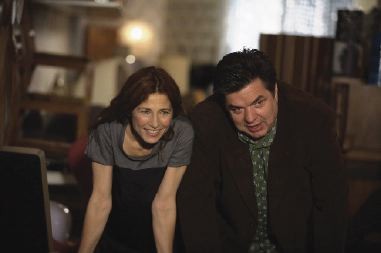Please give

Filmmaker Nicole Holofcener is intrigued by problems. Not gigantic problems, such as asteroids hurtling toward Earth or the destruction of rain forests, but smallish personal problems: coping with a best buddy’s wedding, dealing with a pushy mother, realizing that you’re not as successful as your longtime friends. Holof cener addresses these and other problems in Walking and Talking (1996), Lovely and Amazing (2001) and Friends with Money (2006). In her new and most ambitious film, Please Give, the writer/director widens the playing field to include a more diverse set of characters and situations, making the problems that confront them riskier and more daunting.
At the center of the film is Kate (Catherine Keener, a Holofcener regular), who runs an upscale used furniture store in Manhattan with her good-natured husband, Alex (Oliver Platt). They have plenty of money, lots of free time and a 15-year-old daughter, Abby (Sarah Steele), who seems reasonably well adjusted. But Kate is carrying around something far heavier than a maple armoire: guilt. Guilt that she is well off when others around her, especially the ever-present street people, are in such need; guilt that she gets her furniture from estate sales, where she buys it cheap from grieving people and re sells it at a significant mark-up a few weeks later; guilt that her daughter wants $200 jeans when there is so much pain and suffering in the world. Kate tries to address her guilt by giving large handouts to panhandlers and volunteering at nursing homes and special-education centers, but it is all just so sad for her that she can’t actually provide any help.
Kate also feels guilty because she and Alex have bought the apartment next to theirs from an elderly woman named Andra (Ann Guilbert in a terrific performance). They plan on knocking down the walls and expanding their home once Andra dies. This makes Kate feel like a circling vulture, a feeling reinforced by Andra’s two grandchildren: Rebecca (Rebecca Hall), a soft-spoken radiologist who spends her days giving mammograms, and Mary (Amanda Peet), a misanthropic spa technician who spends her days giving facials. The sisters have mixed feelings about their grandmother, who has been a nasty piece of work for as long as they can remember. Mary allows this simmering resentment to affect the regularity of her visits, leaving the day-to-day chores to Rebecca, who is driven by—you guessed it—guilt. Please Give revolves around the intersection of these two families, examining how each is trying to cope with the loneliness and stress of New York City.
Much of the power and poignancy of Holofcener’s scenes derives from her stinging and truthful dialogue. Some times the dialogue is laugh-out-loud funny, as in a scene in which Andra, on an outing to the country to see the turning of the leaves, comes across like a rude stand-up comedian. Other times, it shows Holofcener’s ability to reveal quick flashes of subtext in even the most mundane of exchanges, as when Kate visits the apartment of a recently deceased woman and finds herself refereeing a verbal battle between siblings over the value of furniture—monetary versus personal.
Part of the success of scenes like these and others is Keener’s ability to express confusion and vulnerability at the same time. Though we are tempted to dismiss Kate as a standard case of liberal guilt, the look on her face when she finds herself unable to shoot baskets with a girl with a developmental disability, or when she overhears haughty buyers scoff at a piece of furniture that graced someone’s home for decades, reveals that her pain comes from a deep well of emotion. It is the same well to which Holofcener goes for her stories and characters. In Please Give, her bucket overflows.




